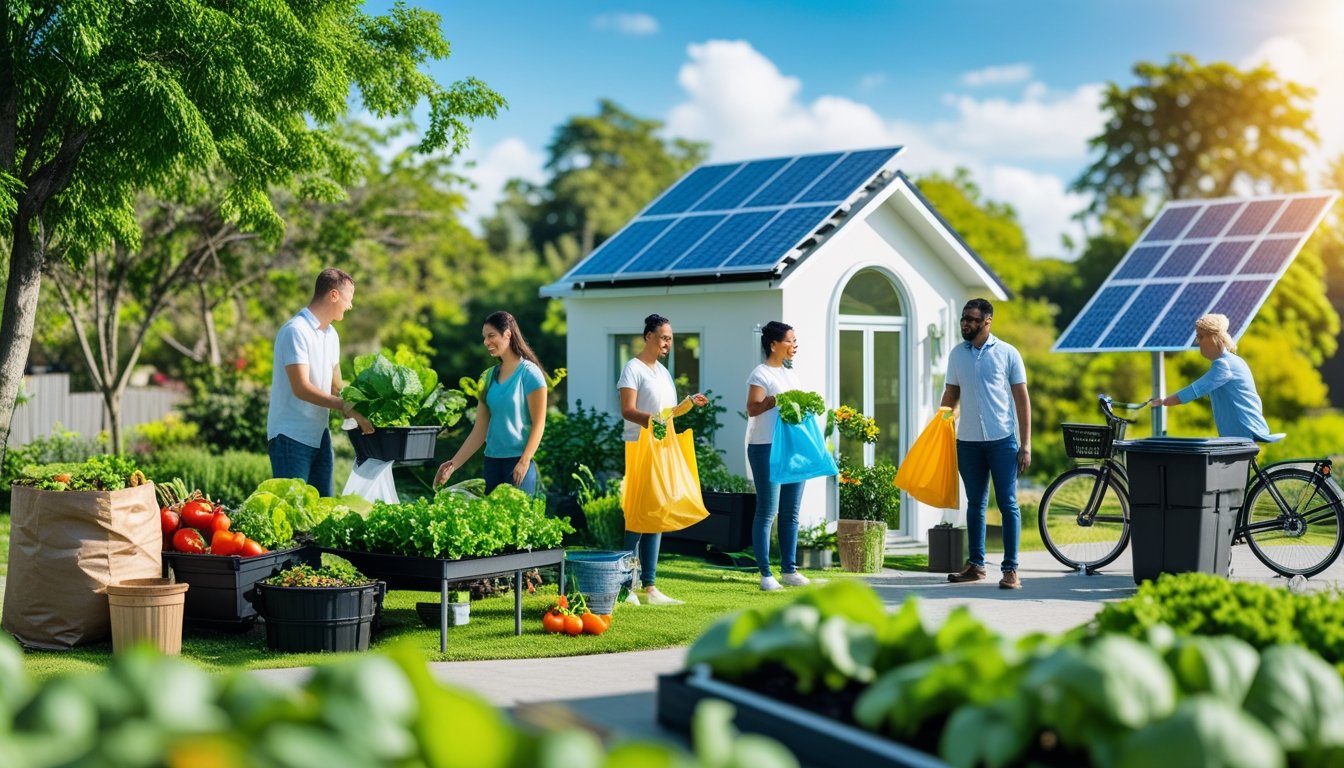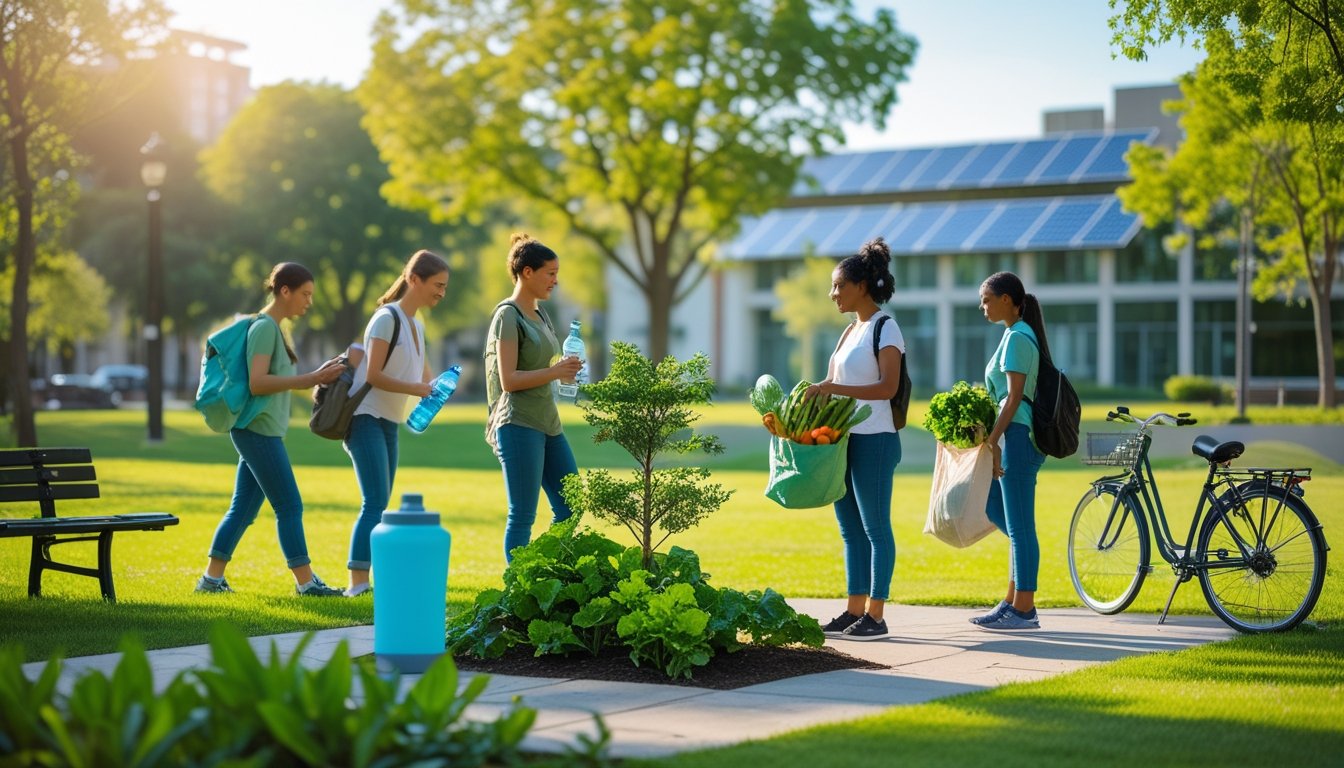Late updated: 10 Jun 2025 08:06
Written by: Sarah Hollister
Sustainable Living Tips for a Greener Lifestyle: Practical Strategies for Everyday Changes
Embracing a sustainable lifestyle can seem daunting, but it's all about making small changes that accumulate over time. By taking simple steps to consume fewer resources and reduce waste, we can significantly contribute to a healthier planet. These adjustments don't require immense sacrifices, yet they foster a profound impact on our environment.

Focusing on sustainability doesn't mean overhauling our lives entirely. It can be as straightforward as building a capsule wardrobe, where we maintain a versatile collection of clothing items to cut down on unnecessary consumption. Small shifts in daily routines can lead to a deep-rooted, greener lifestyle that benefits both us and the natural world.
We will explore various practical tips and actions that fit seamlessly into our everyday lives. Whether we're seasoned advocates of sustainable living or just getting started, these strategies will help us create a cleaner, more sustainable future for ourselves and future generations.
Key Takeaways
- Sustainable living involves small, impactful changes in daily habits.
- A capsule wardrobe is an effective way to reduce clothing consumption.
- Simple lifestyle tweaks help promote long-term environmental health.
Foundations of Sustainable Living
To embark on a journey toward a sustainable lifestyle, we must first grasp its core principles. By recognising our environmental impact and making conscious choices, we pave the way for a more eco-friendly future. This section covers essential concepts and practical tips for sustainable living.
What is Sustainable Living?
Sustainable living is a lifestyle choice that prioritises the health of our planet. It involves adopting habits that reduce our environmental footprint by conserving resources and minimising waste. This approach is not only about altering daily routines but embracing sustainable practices across all aspects of life, such as energy consumption, transportation, and food choices.
By living sustainably, we contribute to mitigating climate change and safeguarding our environment for future generations. It encourages us to be mindful of our consumption patterns and make eco-friendly decisions that have lasting benefits for the planet.
Recognising Your Environmental Impact
Understanding our environmental impact is crucial for motivating change. Our individual actions, whether it be energy use, waste production, or water consumption, significantly affect the planet’s health. For instance, using non-renewable energy sources contributes to greenhouse gas emissions, exacerbating climate change.
Awareness of our carbon footprint can guide us in assessing our daily habits. Tracking and measuring our impact help identify areas for improvement. Simple actions, like reducing unnecessary travel or choosing sustainable products, can collectively lead to substantial environmental benefits. Adjusting these behaviours enhances our overall contribution to a sustainable society.
Practical Sustainable Living Tips
Incorporating sustainable practices into our daily lives involves small yet effective changes. Consider swapping incandescent bulbs for energy-efficient LED lights, which consume less power and are less harmful over time. Another critical area is transportation; opting for public transport, cycling, or carpooling reduces emissions.
Mindful consumption is another essential element. Reducing, Reusing, and Recycling are effective ways to lessen waste. Creating a capsule wardrobe with versatile pieces can cut down on fashion waste and promote thoughtful purchasing. At home, we can embrace green cleaning methods and choose eco-friendly products to decrease our ecological footprint further.
Engaging in these practices not only benefits the planet but also fosters a community committed to sustainable living. Through collective effort, we create a supportive environment that encourages broader adoption of eco-friendly habits.
Everyday Actions for a Greener Lifestyle

Adopting sustainable habits in our daily lives can significantly reduce our environmental impact. These small yet meaningful actions can include reducing waste, enhancing energy efficiency, choosing sustainable transportation, and making eco-friendly food choices.
Reduce, Reuse, Recycle: Minimising Waste
Aiming to minimise waste in our lives begins with small steps. We can reduce waste by avoiding single-use plastics, opting instead for reusable products like glass containers or reusable cotton pads. Reusing items where possible extends their life, and recycling helps divert materials from landfills. Composting organic waste also returns nutrients to the soil, supporting our gardens. Embracing minimalism is another effective approach by prioritising quality over quantity, reducing clutter and unnecessary consumption.
Energy Efficiency at Home
Making our homes energy efficient not only conserves resources but also cuts down on utility bills. Using energy-efficient appliances and switching to energy-efficient lighting such as LED bulbs are practical steps. Maximising the use of natural light reduces our reliance on artificial lighting. Proper insulation helps maintain a comfortable temperature, decreasing the need for heating and cooling systems. Additionally, using eco-friendly cleaning products or homemade cleaners can further reduce our carbon footprint. Exploring renewable energy options like solar power can provide a sustainable energy source for our homes.
Sustainable Transportation Solutions
Transport choices play a crucial role in reducing our carbon footprint. Choosing public transportation or engaging in sustainable commuting options like carpooling, cycling, or walking can significantly lower greenhouse gas emissions. For those of us who drive, considering electric vehicles can be a more sustainable option. The key is reducing reliance on fossil fuels where possible and opting for transportation methods that have a lower environmental impact.
Eco-Friendly Food Choices and Habits
Our food choices greatly influence our environmental impact. Prioritising locally sourced produce and organic food supports sustainable agricultural practices and reduces carbon emissions associated with transport. Shopping at local farmers’ markets promotes sustainable agriculture. Eating seasonal foods ensures freshness and supports biodiversity. Incorporating sustainable practices in the kitchen, such as reducing food waste and conserving water during cooking, contributes to a healthier planet. Considering the circular economy by choosing sustainable brands and materials further strengthens our eco-friendly lifestyle.
Frequently Asked Questions

Sustainable living involves integrating eco-friendly practices into our daily lives. By adopting habits that support the 5 R's, conserving biodiversity, reducing carbon footprints, and supporting sustainable development goals, we can achieve positive environmental impact. Here are some key questions answered.
What are practical ways to incorporate the 5 R's of sustainable living into daily routines?
We can start by Refusing unnecessary items, such as plastic bags and straws. Reducing waste means buying only what we need. Reusing items, like jars and bags, helps cut down on new purchases. Recycling involves sorting items correctly, and Rotting, or composting, reduces organic waste. These steps form a manageable routine.
How can individuals contribute to biodiversity conservation through their lifestyle choices?
Supporting biodiversity means choosing local and organic produce that doesn't harm local ecosystems. We should plant native species in our gardens to help local wildlife thrive. Avoiding products that contribute to deforestation, such as palm oil, and supporting wildlife-friendly initiatives is also crucial for conservation.
What are effective strategies to minimise one's carbon footprint for a more sustainable future?
To lower our carbon footprint, we can use public transportation, cycle, or walk whenever possible. Reducing energy consumption at home by using energy-efficient appliances and lighting is important. Participating in carbon offset programmes through tree planting and supporting renewable energy companies can further mitigate our impact.
Why is it vital to adopt sustainable living practices, and what are its long-term benefits?
Adopting sustainable practices aids in preserving our environment for future generations. It reduces pollution and waste, leading to healthier ecosystems. Over time, this results in cleaner air and water, conserving natural resources, and fostering economic savings. It also encourages a sense of community responsibility and resilience.
Which sustainable development goals can be most directly influenced by personal action, and how?
Individuals can impact goals such as Clean Water and Sanitation by using water-saving techniques, and Affordable and Clean Energy through energy-efficient practices. We can support Responsible Consumption and Production by choosing sustainable products. Contributing to Life on Land involves respecting natural habitats and reducing our ecological footprint.
What constitutes a fully sustainable lifestyle, and is it achievable in modern society?
A fully sustainable lifestyle encompasses zero waste, complete reliance on renewable energy, and minimal consumption. While achieving this can be challenging, especially in urban settings, we can strive towards it incrementally. Efforts can be enhanced by leveraging technology and advocating for policies that promote sustainable infrastructure and practices.
